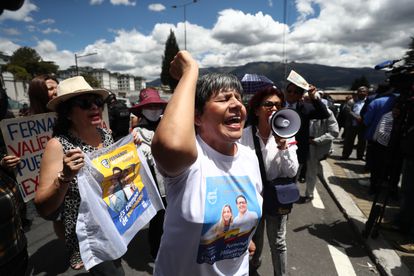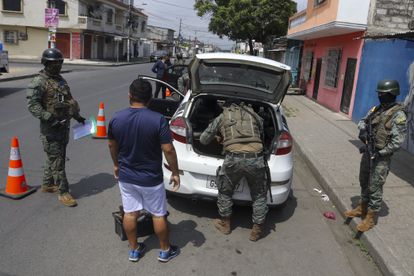Ecuadorian presidential candidate Fernando Villavicencio was shot dead last Wednesday in Quito, the capital of Ecuador. On Sunday, the candidates will take part in a televised debate. And next August 20, in less than two weeks, more than 13 million Ecuadorians will cast their vote. Insecurity, an issue that already dominated the campaign before Villavicencio’s assassination, now dominates every speech, fueling distrust in the government of President Guillermo Lasso. Meanwhile, the shadow of drug violence hangs over the first round of the presidential election.
As it faces its worst security crisis in recent history, Ecuador is at “war against the mafias.” That’s according to Ecuador’s Defense Minister General Luis Lara, who made the statement after Villavicencio’s murder. President Lasso used the same phrase two years ago, when he declared a state of emergency following several riots in the country’s prisons. This narrative of war is dominating the discourse of the government, opposition leaders and the opinion columns of the country’s leading newspapers.
“Fernando fought until his last breath to save us from this state of evil and impunity in which we are trapped. If his sacrifice should serve for anything, it is to bury the mafias, the criminals disguised as politicians,” said Andrea González Nader, vice-presidential candidate and Villavicencio’s running mate in Movimiento Construye (Build Ecuador Movement). The presidential candidates are all talking about the same problem: extortion, gangs, drug cartels, criminal bosses, prison riots and political assassinations.
“This is the moment for all of us who believe that the mafias and criminals must be defeated,” said businessman and former vice president Otto Sonnenholzner, from the Actuemos (Let’s Act) alliance, who is polling in second place of the eight candidates. Sonnenholzner argues that criminals “control crime from the country’s prisons” and have plunged Ecuador into a wave of violence similar to what was seen in “Colombia in the 1980s” or “Mexico in the 1990s.” To address the crisis, he has proposed new prison measures to prevent the most dangerous prisoners from having contact with the outside world.
Leftist candidate Yaku Pérez, in turn, called for a pact between the candidates to put the country’s needs first, but only one of his rivals responded to the call.

The businessman Jan Topic, who has drawn attention for wanting to emulate the security strategy of Nayib Bukele in El Salvador, has begun to capitalize on his slogan “Ecuador without fear.” His result at the August 20 vote will reveal how willing Ecuadorian voters are to embrace iron-fist policies against crime.
Luisa González, from the Movimiento Revolución Ciudadana (Citizen Revolution Movement), founded by former president Rafael Correa, pointed out that Villavicencio is not the only politician to have been attacked. In February, Omar Menéndez, the candidate for mayor of Puerto López, was also assassinated, and last December, Javier Pincay, the candidate for mayor of Portoviejo, survived an attack. The mayor of Durán, Luis Chonillo, was also shot in May and fled the country. He now governs remotely. In July, Agustín Intriago, the mayor of Manta, was shot six times. The list of attacks and threats from organized crime, such as those denounced by Villavicencio before his murder, is practically endless. The latest victim was Estefany Puente, a candidate for the National Assembly, who escaped unharmed after being attacked on Friday by two men on a motorcycle, who opened fire on her car.
González has blamed the wave of violence on Lasso’s “ineptitude.” If elected, she promises that she will “dismantle criminal organizations, bring peace to prisons and eliminate extortion mafias.” González, who is the only female candidate in the race, says she intends to do this by working with the army, ridding the police of corruption, and introducing policy that addresses the root causes of violence, such as lack of education and lack of opportunities. While she is leading in the polls, it is not clear whether the assassination of Villavicencio, who was close to Lasso, will strengthen González’s advantage or mobilize voters who oppose Correa.
“The analyses that everyone made are useless now,” says political analyst Pedro Donoso. In his opinion, the murder of Villavicencio marks “a turning point” since May, when Lasso dissolved the National Assembly and called early elections to avoid an impeachment vote. According to Donoso, until a few days ago, four out of 10 voters were still undecided, a considerable number were going to cast blank ballots, and González’s lead seemed practically assured. “The attack will have consequences, but we still don’t know what they will be,” he acknowledges.
What is clear is that insecurity is at the top of the agenda. “Today, violence is what drives votes. It is not on the ballot, but is present in all of Ecuador’s political life,” says Donoso. In his opinion, the visibility of the attacks against Villavicencio and other politicians is a challenge for the state, just as Ecuadorians prepare to elect a new government. “The murder of Villavicencio sends a political message against democracy, the crime seeks to show that criminals are the ones who impose the rules,” he says.

The homicide rate in Ecuador has tripled in the last decade. Almost two out of every three Ecuadorians believe the country is insecure, according to a poll by the Gallup consultancy published in January. It was the highest number in Latin America. Almost 95% of citizens believe that Ecuador “is on the wrong path” and six out of 10 “do not trust the state,” according to a survey by Perfiles de Opinión last July. Lasso has the lowest approval ratings of Latin America, with only 14%, while 87% of the population is dissatisfied with democracy, according to the latest issue of Latinobarómetro. Almost one in five Ecuadorians support authoritarianism, according to that study.
Now, 11 days after the murder of Villavicencio, the country is returning to the polls. Ecuador will vote amid a state of emergency, which was called following the assassination, and fears over whether there will be more attacks on election day. Despite this, the prevailing view among the candidates, electoral authorities and the government is that postponing the vote would further deepen the crisis. “It is the worst message that the state could send,” Donoso agrees. The winner of the election will govern Ecuador from November 2023 to May 2025.
Sign up for our weekly newsletter to get more English-language news coverage from EL PAÍS USA Edition
This post was originally published on this site be sure to check out more of their content.






